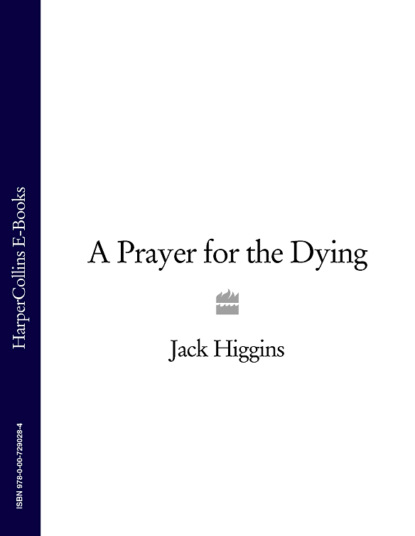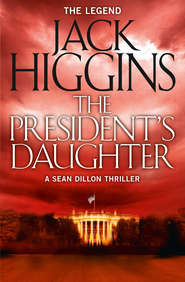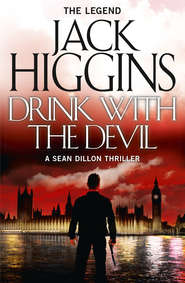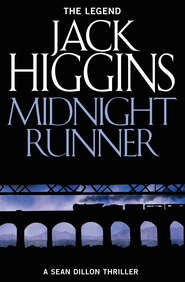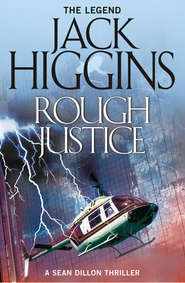По всем вопросам обращайтесь на: info@litportal.ru
(©) 2003-2024.
✖
A Prayer for the Dying
Автор
Год написания книги
2018
Настройки чтения
Размер шрифта
Высота строк
Поля
‘What, now, in this rain?’ The gravedigger looked at him bewildered. ‘It can wait till later, can’t it?’
‘No, it damn well can’t.’
O’Brien turned on heel and walked away and the grave-digger, swearing softly, pulled back the canvas sheet and got to work.
Father da Costa usually enjoyed a walk in the rain. It gave him a safe, enclosed feeling. Some psychological thing harking back to childhood, he supposed. But not now. Now, he felt restless and ill at case. Still disturbed by what had happened at the graveside.
He paused to break a personal vow by lighting a cigarette, awkwardly because of the umbrella in his left hand. He had recently reduced his consumption to five a day, and those he smoked only during the evening, a pleasure to be savoured by anticipation, but under the circumstances …
He moved on into the oldest part of the cemetery, a section he had discovered with delight only a month or two previously. Here amongst the pines and the cypresses were superb Victorian-Gothic tombs, winged angels in marble, bronzed effigies of Death. Something different on every hand and on each slab a pious, sentimental, implacable belief in the hereafter was recorded.
He didn’t see a living soul until he went round a corner between rhododendron bushes and paused abruptly. The path divided some ten yards in front of him and at the intersection stood a rather interesting grave. A door between marble pillars, partially open. In front of it the bronze figure of a woman in the act of rising from a chair.
A man in a dark overcoat, head bare, knelt before her on one knee. It was very quiet – only the rushing of the rain into wet earth and Father da Costa hesitated for a moment, unwilling to intrude on such a moment of personal grief.
And then an extraordinary thing happened. A priest stepped in through the eternity door at the back of the grave. A youngish man who wore a dark clerical raincoat over his cassock and a black hat.
What took place then was like something out of a nightmare, frozen in time, no reality to it at all. As the man in the dark overcoat glanced up, the priest produced an automatic with a long black silencer on the end. There was a dull thud as he fired. Fragments of bone and brain sprayed out from the rear of his victim’s skull as he was slammed back against the gravel.
Father da Costa gave a hoarse cry, already seconds too late, ‘For God’s sake no!’
The young priest, in the act of stepping towards his victim, looked up, aware of da Costa for the first time. The arm swung instantly as he took deliberate aim and da Costa looked at Death, at the white devil’s face on him, the dark, dark eyes.
And then, unaccountably, as his lips moved in prayer, the gun was lowered. The priest bent down to pick something up. The dark eyes stared into his for a second longer and then he slipped back through the door and was gone.
Father da Costa threw the umbrella to one side and dropped to his knees beside the man who had been shot. Blood trickled from the nostrils, the eyes were half-closed and yet, incredibly, there was still the sound of laboured breathing.
He began to recite in a firm voice, the prayers for the dying. Go, Christian Soul, from this world, in the Name of God the Father Almighty who created thee and then, with a hoarse rattle, the breathing stopped abruptly.
Fallon followed the path at the north end of the cemetery, walking fast, but not too fast. Not that it mattered. He was well screened by rhododendron bushes and it was unlikely that there would be anyone about in such weather.
The priest had been unfortunate. One of those time and chance things. It occurred to him, with something like amusement and not for the first time in his life, that no matter how well you planned, something unexpected always seemed to turn up.
He moved into a small wood and found the van parked in the track out of sight as he had left it. There was no one in the driver’s seat and he frowned.
‘Varley, where are you?’ he called softly.
A small man in a raincoat and cloth cap came blundering through the trees, mouth gaping, clutching a pair of binoculars in one hand. He learned against the side of the van, fighting for breath.
Fallon shook him roughly by the shoulder. ‘Where in the hell have you been?’
‘I was watching,’ Varley gasped. He raised the binoculars. ‘Mr Meehan’s orders. That priest. He saw you. Why didn’t you give it to him?’
Fallon opened the van door and shoved him in behind the wheel. ‘Shut up and get driving!’
He went round to the rear, opened the doors, got in and closed them again as the engine roared into life and they lurched away along the rough track.
He opened the small window at the rear of the driver’s compartment. ‘Steady,’ he said. ‘Easy does it. The slower the better. A friend of mine once robbed a bank and made his escape in an ice-cream van that couldn’t do more than twenty miles an hour. They expect you to move like hell after a killing so do the other thing.’
He started to divest himself of the raincoat and cassock. Underneath he wore a dark sweater and grey slacks. His navy blue trench-coat was ready on the seat and he pulled it on. Then he took off the rubber galoshes he was wearing.
Varley was sweating as they turned into the dual carriageway. ‘Oh, God,’ he moaned. ‘Mr Meehan will have our balls for this.’
‘Let me worry about Meehan.’ Fallon bundled the priest’s clothing into a canvas holdall and zipped it shut.
‘You don’t know him, Mr Fallon,’ Varley said. ‘He’s the devil himself when he’s mad. There was a fella called Gregson a month or two back. Professional gambler. Bent as a corkscrew. He took one of Mr Meehan’s clubs for five grand. When the boys brought him in, Mr Meehan nailed his hands to a table top. Did it himself, too. Six-inch nails and a five-pound hammer. Left him like that for five hours. To consider the error of his ways, that’s what he said.’
‘What did he do to him after that?’ Fallon asked.
‘I was there when they took the nails out. It was horrible. Gregson was in a terrible state. And Mr Meehan, he pats him on the cheek and tells him to be a good boy in future. Then he gives him a tenner and sends him to see this Paki doctor he uses.’ Varley shuddered. ‘I tell you, Mr Fallon, he’s no man to cross.’
‘He certainly seems to have his own special way of winning friends and influencing people,’ Fallon said. ‘The priest back there? Do you know him?’
‘Father da Costa?’ Varley nodded. ‘Has a broken-down old church near the centre of the city. Holy Name, it’s called. He runs the crypt as a kind of doss house for down-and-outs. About the only congregation he gets these days. One of these areas where they’ve pulled down all the houses.’
‘Sounds interesting. Take me there.’
The car swerved violently, so great was Varley’s suprise and he had to fight to regain control of the wheel. ‘Don’t be crazy. My orders were to take you straight back to the farm.’
‘I’m changing them,’ Fallon said simply and he sat back and lit a cigarette.
The Church of the Holy Name was in Rockingham Street, sandwiched between gleaming new cement and glass office blocks on the one hand and shabby, decaying warehouses on the other. Higher up the street there was a vast brickfield where old Victorian slum houses had been cleared. The bulldozers were already at work digging the foundation for more tower blocks.
Varley parked the van opposite the church and Fallon got out. It was a Victorian-Gothic monstrosity with a squat, ugly tower at its centre, the whole networked with scaffolding although there didn’t seem to be any work in progress.
‘It isn’t exactly a hive of industry,’ Fallon said.
‘They ran out of money. The way I hear it the bloody place is falling down.’ Varley wiped sweat from his brow nervously. ‘Let’s get out of it, Mr Fallon – please.’
‘In a minute.’
Fallon crossed the road to the main entrance. There was the usual board outside with da Costa’s name there and the times of Mass. Confession was at one o’clock and five on weekdays. He stood there, staring at the board for a moment and then he smiled slowly, turned and went back to the van.
He leaned in the window. ‘This funeral place of Meehan’s – where is it?’
‘Paul’s Square,’ Varley said. ‘It’s only ten minutes from here on the side of the town hall.’
‘I’ve got things to do,’ Fallon said. ‘Tell Meehan I’ll meet him there at two o’clock.’
‘For Christ’s sake, Mr Fallon,’ Varley said frantically. ‘You can’t do that,’ but Fallon was already halfway across the road going back towards the church.
Varley moaned, ‘You bastard!’ and he moved into gear and drove away.
Fallon didn’t go into the church. Instead, he walked up the side street beside a high, greystone wall. There was an old cemetery inside, flat tombstones mainly and a house in one corner, presumably the presbytery. It looked to be in about the same state as the church.
It was a sad, grey sort of place, the leafless trees black with a century of city soot that even the rain could not wash away and he was filled with a curious melancholy. This was what it all came to in the end whichever way you looked at it. Words on cracked stones. A gate clicked behind him and he turned sharply.
A young woman was coming down the path from the presbytery, an old trenchcoat over her shoulders against the rain. She carried an ebony walking stick in one hand and there was a bundle of sheet music under the other arm.





